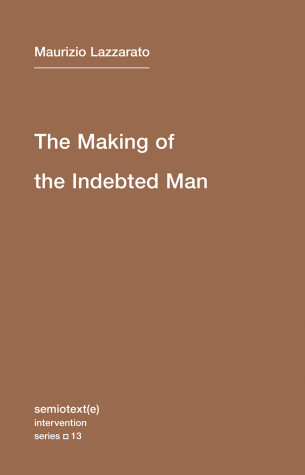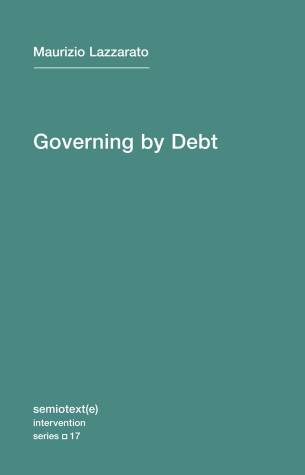Semiotext(e) / Intervention
2 primary works • 3 total works
Book 13
"The debtor-creditor relation, which is at the heart of this book, sharpens mechanisms of exploitation and domination indiscriminately, since, in it, there is no distinction between workers and the unemployed, consumers and producers, working and non-working populations, between retirees and welfare recipients. They are all 'debtors,' guilty and responsible in the eyes of capital, which has become the Great, the Universal, Creditor."
—from The Making of the Indebted Man
Debt—both public debt and private debt—has become a major concern of economic and political leaders. In The Making of the Indebted Man, Maurizio Lazzarato shows that, far from being a threat to the capitalist economy, debt lies at the very core of the neoliberal project. Through a reading of Karl Marx's lesser-known youthful writings on John Mill, and a rereading of writings by Friedrich Nietzsche, Gilles Deleuze, Félix Guattari, and Michel Foucault, Lazzarato demonstrates that debt is above all a political construction, and that the creditor/debtor relation is the fundamental social relation of Western societies.
Debt cannot be reduced to a simple economic mechanism, for it is also a technique of “public safety” through which individual and collective subjectivities are governed and controlled. Its aim is to minimize the uncertainty of the time and behavior of the governed. We are forever sinking further into debt to the State, to private insurance, and, on a more general level, to corporations. To insure that we honor our debts, we are at once encouraged and compelled to become the “entrepreneurs” of our lives, of our “human capital.” In this way, our entire material, psychological, and affective horizon is upended and reconfigured.
How do we extricate ourselves from this impossible situation? How do we escape the neoliberal condition of the indebted man? Lazzarato argues that we will have to recognize that there is no simple technical, economic, or financial solution. We must instead radically challenge the fundamental social relation structuring capitalism: the system of debt.
Book 17
Experts, pundits, and politicians agree: public debt is hindering growth and increasing unemployment. Governments must reduce debt at all cost if they want to restore confidence and get back on a path to prosperity. Maurizio Lazzarato's diagnosis, however, is completely different: under capitalism, debt is not primarily a question of budget and economic concerns but a political relation of subjection and enslavement. Debt has become infinite and unpayable. It disciplines populations, calls for structural reforms, justifies authoritarian crackdowns, and even legitimizes the suspension of democracy in favor of “technocratic governments” beholden to the interests of capital. The 2008 economic crisis only accelerated the establishment of a “new State capitalism,” which has carried out a massive confiscation of societies' wealth through taxes. And who benefits? Finance capital. In a calamitous return to the situation before the two world wars, the entire process of accumulation is now governed by finance, which has absorbed sectors it once ignored, like higher education, and today is often identified with life itself. Faced with the current catastrophe and the disaster to come, Lazzarato contends, we must overcome capitalist valorization and reappropriate our existence, knowledge, and technology.
In Governing by Debt, Lazzarato confronts a wide range of thinkers—from Félix Guattari and Michel Foucault to David Graeber and Carl Schmitt—and draws on examples from the United States and Europe to argue that it is time that we unite in a collective refusal of this most dire status quo.
We are living in apocalyptic times. In Capital Hates Everyone, famed sociologist Maurice Lazzarato points to a stark choice emerging from the magma of today's world events: fascism or revolution. Fascism now drives the course of democracies as they grow less and less liberal and increasingly subject to the law of capital. Since the 1970s, Lazzarato writes, capital has entered a logic of war. It has become, by the power conferred on it by financialization, a political force intent on destruction. Lazzarato urges us to reject the illusory consolations of a technology-abetted "new" kind of capitalism and choose revolution over fascism.


